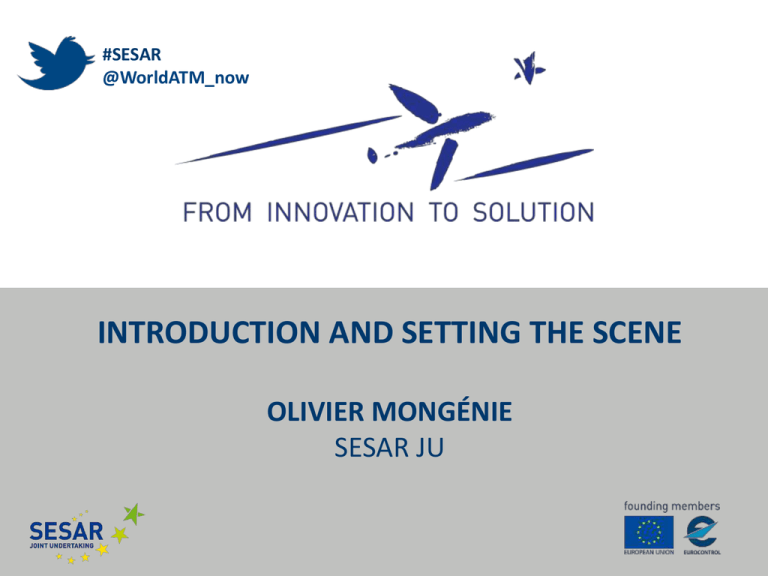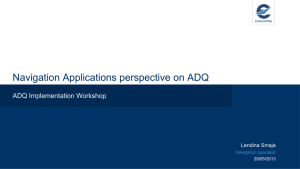the set of presentations
advertisement

#SESAR @WorldATM_now INTRODUCTION AND SETTING THE SCENE OLIVIER MONGÉNIE SESAR JU Agenda • • • • • • • • 2 16:00 – Introduction by the SJU Olivier Mongénie, SESAR Joint Undertaking, Airport Integration & Throughput Programme Manager 16:10 – GBAS concept and technology José Manuel Rísquez, ENAIRE (INECO), OFA01.01.01 (LVPs using GBAS) Coordinator 16:25 – How is the GBAS SESAR Solution validated? – Operational validation activities in Release 4 Andreas Lipp, EUROCONTROL, OFA01.01.01 Contributor – Technical validation activities in Release 4 • Overview of the technical validations and ground system Udo Knick, Thales, 15.03.06 (GBAS Cat II/III L1 Approach) Project Manager • Airborne system (mainline aircraft) Dietmar Kleinitz, Airbus, 09.12 (GBAS Cat II/III) Project Manager • Airborne system (business aircraft) Jolana Dvorska, Honeywell, OFA01.01.01 Contributor 17:00 – Demonstration activities: Augmented Approaches to Land Large Scale Demonstration Project Jolana Dvorska, Honeywell, Augmented Approaches to Land Contributor 17:05 – Standardisation activities Andreas Lipp, EUROCONTROL, OFA01.01.01 Contributor 17:15 – Regulatory activities Maria Algar Ruiz, EASA, ATM/ANS-SESAR Coordinator 17:25 – Conclusion and Q&A session Olivier Mongénie, SESAR Joint Undertaking, Airport Integration & Throughput Programme Manager 17:45 – Wrap up and close Innovation pipeline The SESAR Pipeline 3 Phase 1 Phase 2/1 Phase 2/2 Phase 3 Delivery SESAR Development Methodology European Operational Concept Validation Methodology (E-OCVM) SESAR Scope ATM needs V0 Gather and access ATM performance needs Scope Feasibility V1 Scope operational concept and develop validation plans Pre-industrial development & integration Industrialisation V2 V3 V4 Iteratively develop and evaluate concept Build, consolidate and test Industrialisation and approval Concept validation Requirements development Concept development Technical development and verification Integration 4 The SESAR Airport Concept Elements Integrated Arrival/Departure Management at Airports CWP Airport LVPs using GBAS Arrival & Departure Management Integrated Controller Working Position Low Visibility procedures using satellite GBAS Enhanced Runway Throughput Dynamic vortex Enhanced ROT separation Time based separation Pilot enhanced vision ACI/SJU SURFACE MANAGEMENT AND RUNWAY MANAGEMENT WORKSHOP SESAR Airport Domain Airport Safety Nets Ground safety nets Surveillance Ground System Enhancement Integrated Surface Management Enhanced Vision System Synthetic Vision Guidance System Combined Vision System Remote Tower Enhanced situational awareness Surface planning & routing Remote Tower Airport Operations Management User Driven Prioritisation Process Airport Operations Planning System interoperability with air & ground data sharing Enhanced Decision Support Tools Enhanced situational awareness The SESAR Airport Concept Elements Integrated Arrival/Departure Management at Airports CWP Airport LVPs using GBAS Arrival & Departure Management Integrated Controller Working Position Low Visibility procedures using satellite GBAS Enhanced Runway Throughput Dynamic vortex Enhanced ROT separation Time based separation Pilot enhanced vision ACI/SJU SURFACE MANAGEMENT AND RUNWAY MANAGEMENT WORKSHOP SESAR Airport Domain Airport Safety Nets Ground safety nets Surveillance Ground System Enhancement Integrated Surface Management Enhanced Vision System Synthetic Vision Guidance System Combined Vision System Remote Tower Enhanced situational awareness Surface planning & routing Remote Tower Airport Operations Management User Driven Prioritisation Process Airport Operations Planning System interoperability with air & ground data sharing Enhanced Decision Support Tools Enhanced situational awareness The SESAR GBAS Community 7 GBAS SESAR Solution • Precision approaches using GBAS CAT II/III based on GPS L1 – Part of Release 4 – Supported by 3 V3 validation exercises • 1 operational validation • 2 technical validations – All validation activities have taken place – Initial validation results and final documents still need to be consolidated and assessed – SESAR Solution data pack expected by end 2015 8 #SESAR @WorldATM_now GBAS CONCEPT & TECHNOLOGY JOSÉ MANUEL RISQUEZ ENAIRE/INECO Agenda • Augmentation principles • GBAS applications in SESAR • SESAR SOLUTION: Validation & Demonstration Strategy 10 Augmentation Principles 11 Augmentation principles • NAVSTAR GPS fully operational in 1995 (Enroute-TMA) • However…not good enough to allow safe landings • ICAO and industry foresaw an alternative solution to ILS, to provide an approach supported by the GPS and appropriate augmentation. • The system is called the Ground Based Augmentation System (GBAS) 12 Augmentation principles GBAS relies on differential GNSS (e.g. GPS) signal 1. Satellites(e.g. GPS) producing ranging signals. 2. Ground subsystem providing a VDB (the final approach path, corrections and data for integrity) 3. Airborne subsystem: • Receives and processes GPS and VDB data, • Computes a position and deviations 13 GBAS concept Quiz Antenna real position is 40,40° N – 3,60° W Antenna GPS position is 40,42° N – 3,61° W GBAS ground system informs you that there is an error of 0,02 °N and 0,01°W Your flight GPS position is 40,49° N – 3,67° W Your more accurate position with GBAS would be 40,xx ° N – 3,yy° W ??? 14 GBAS concept Quiz: Solution Antenna real position is 40,40° N – 3,60° W Antenna GPS position is 40,42° N – 3,61° W GBAS ground system informs you that there is an error of 0,02 ° N and 0,01°W Your flight GPS position is 40,49° N – 3,67° W Your more accurate position with GBAS would be 40,47 ° N – 3,66° W 15 Augmentation principles: GBAS CAT I Ground Stations Extracted from flyGLS.net GBAS precursor (S-CAT I) GBAS for private operations 16 Public CAT I approached in operation GBAS applications in SESAR 17 GBAS Apps in SESAR: Displaced Thresholds • GLS approach - Less risk of wake vortex encounter: Reduced separation (GLS:GBAS Landing System) • GBAS can transmit multiple Final Approach Segments: better costeffectiveness vs ILS. • Less RWY Occupancy time and noise impact reduction are other benefits. 18 GBAS Apps in SESAR: Increase Glide Slopes 3º 3.2º 3.4º • GBAS is capable of transmitting multiple Final Approach Segments and even different Glide Path Angles (GPA) with a single installation. • GLS-Noise-reduced approaches are possible by avoiding lowflying over densely populated areas 19 GBAS Apps in SESAR: RNP-GLS-Curved Approches • RNP: Very predictable Initial and Intermediate curved approach segments (Radius to Fix turns) • GBAS: GLS Final Approach Segment (i.e. different slopes, different THR, shortest possible length) • Noise-reduced approaches are possible due to a more flexible approach path adaption 20 SESAR SOLUTION: GBAS CAT II/III Validation & Demonstration Strategy 21 SESAR Solution: GBAS CAT II/III (1/5) • CAT I approaches using GBAS (GAST-C) already certified • However, CATII/III approaches require better performance as well as new functions and monitors in ground stations and on board receivers… • GBAS Approach Service Type D CATII/III (GAST-D) is based on existing GPS constellation… • Additional GNSS constellation may improve resilience 22 CAT I CAT II CAT IIIb Automatic Landing Photos Courtesy Thales SESAR Solution: GBAS CAT II/III (2/5) ARR Why? A 2-4 DEP C1-6 C1 -5 C1-3 C1 -4 C1 -1 • When low-visibility conditions occur on an airport, a better quality of ILS signal has to be provided to arrivals. • Larger protection areas must be respected • Larger arrival separation must be provided. • Higher delays and flight cancellations. C2-1 TW R A 2-4 0 500 C1 -5 C1-3 C1 -4 C1 -1 C2-1 TW R 23 1000 1500 2000m C1-6 SESAR Solution: GBAS CAT II/III (3/5) GBAS GAST-D can overcome these limitations. SESAR Solution: an integrated set of system and operational elements that will allow performing ILS look-alike CATII/III operations without such protection areas. 24 SESAR Solution: GBAS CATII/III (4/5) Operational Concept: A 2-4 C1-6 • ATC can use a less constraining landing clearance line for aircraft vacating the runway. C1 -5 C1-3 C1 -4 C1 -1 C2-1 • ATC can provide the pilots with late landing clearance, up to 1NM before threshold TW R A 2-4 C1-6 C1 -5 • ATC can reduce the final approach spacing in LVP in front of GBAS equipped aircraft C1-3 C1 -4 0 C1 -1 500 C2-1 TW R 25 1000 1500 2000m SESAR Solution: GBAS CATII/III (5/5) Benefits: • Under Low Visibility Conditions, GBAS CATII/III operation vs ILS CATII/III operation will bring us: – – – – – 26 higher airport resilience better predictability less delays less use of alternative airports and less flight cancellations Standardization and Regulatory process To deploy properly all these elements in any European airport in an homogeneous way, it is required to accomplish in parallel a great standardization and regulatory challenge Ground System equipments Airborne equipments Flight Procedures design SESAR Advantage: people involved in R&D project are also involved in official standardization and regulatory activities 27 Phraseology ATC Procedures … Validation & Demonstration Strategy European – Operational Concept Validation Methodology (Iterative Process) v0 Transversal Areas ATM Needs v1 Scope v2 v3 Feasibility Pre-industrial development & Integration v5 v6 v7 Industr. Deploym. Operat. Decom. Operational Concept RTS Safety Human Performance Interoperability Ground Systems Two airports 28 v4 Airborne Systems Mainline Business #SESAR @WorldATM_now HOW IS THE GBAS SESAR SOLUTION VALIDATED? OPERATIONAL VALIDATION ACTIVITIES RELEASE 4 ANDREAS LIPP EUROCONTROL Agenda • • • • • 30 Operational concept description Validation objectives and method Validation scenarios and platforms Validation execution Achievements GBAS Cat II/III – Operational Improvements Optimised Low visibility operations using GBAS concept based on: ATC to use a landing clearance line for aircraft vacating the runway, instead of today’s ILS CAT III holding ATC to provide the pilots with late landing clearance, up to 1NM before threshold ATC to reduce the final approach spacing in LVP in front of GBAS equipped aircraft Main actors affected; final approach and tower air traffic controllers as well as pilots Validation objectives To reach V3 maturity based on previous V2 validation exercises (fast-time) To assess the increase of runway throughput in LVP considering: Runway configurations Arrival only (segregated runway) Arrival and departure (mixed mode runway) Aircraft fleet equipage Only GBAS aircraft Mix of aircraft equipage between GBAS (60%) and ILS (40%) To evaluate the suitability of runway safety nets and assess the safety of optimised LVP operations based on GBAS To evaluate the ATC workload and the new ATC procedures for final approach spacing. To validate that provision of late landing clearance by ATC does not impair the pilot capability to prepare the landing Validation approach Real-time simulation Simulation Platforms EUROCONTROL eDEP/ITWP - Early Demonstration and Evaluation Platform / Integrated Tower working position EUROCONTROL ESCAPE – A real-time air traffic control simulator for en-route, TMA and approach EUROCONTROL MCS - Multi Cockpit simulator Simulation scenario Charles de Gaulle Airport Simulation Airport The simulated Airport is Paris CDG The setup of the scenarios was such as to apply to a generic airport Peak traffic in order to achieve the optimised throughput - CDG Airport TMA - - CDG Airport north runways 34 Only north RWY 27L simulated RWY 27L was used for arrivals only and in mixed mode arrivals/departures eDEP/ITWP - low visibility settings 35 eDEP/ITWP - Controller working position 36 eDEP/ITWP – GBAS specific HMI changes 37 ESCAPE/Approach - controller working positions 38 ESCAPE/Approach – GBAS specific HMI changes 39 Cockpit simulator 40 Validation Scenarios The simulations included six validation scenarios ILS arrivals only (baseline scenario) ILS arrival/departures (baseline scenario) GBAS arrivals only GBAS arrival/departures GBAS/ILS arrival only GBAS/ILS arrivals/departures Each scenario was run in a simulation hour Several safety scripts, failure scenarios included 41 Validation Execution Real Time Simulation schedule Training: ENAV Air Traffic Controllers training with the new RTS platforms from 16 to 18 September 2014 Simulation: One week, 29 September – 3 October 2014 in EUROCONTROL Experimental Centre, Bretigny Participants: Three air traffic controllers from ENAV, licensed for both Approach and Tower Three pilots from Novair, TuiFly and Airfrance using MCS Other visitors from ATC Unions and SJU Validation results In all validation scenarios an increase of runway throughput or at least the same level was recorded. ATC workload considered acceptable Good situational awareness by ATC The safety of operations is maintained. The final approach spacing for arrival only runway configuration was considered appropriate The final approach spacing for mixed mode runway need to be fine tuned according to airport local constraints. Positive feedback on GBAS HMI elements 43 #SESAR @WorldATM_now HOW IS THE GBAS SESAR SOLUTION VALIDATED? TECHNICAL VALIDATION ACTIVITIES IN RELEASE 4 & GROUND SYSTEM UDO KNICK THALES Agenda Project Objectives SESAR CAT II/III Validation GBAS CAT III Ground Station Ground Subsystem Performance Demonstration CAT III Ground Station Prototype Performance Summary GBAS CAT III projects Objectives GBAS CAT III technology based on GPS L1 C/A (single frequency) to support Automatic approach and landing (including automatic roll-out) down to CAT IIIb Guided take off GBAS CAT III validation performed in SESAR projects for Cat IIIb (including automatic roll-out and guided Take off) for mainline aircraft Cat II or Cat IIIa for business and regional Aircraft SESAR system validation for V3 level of maturity at end of SESAR 1 Demonstration of readiness of the solution for industrialization & approval Confirm that GBAS CAT III has no operationally relevant critical & sensitive zones Verify GBAS CAT III touch-down performance by autoland flight tests & ground and airborne analysis, simulation & measurements Validate GBAS CAT III system standard SESAR CAT II/III Validation Prototype I Ground & System Development Thales Stuttgart Ground Development & Verification DSNA Mainline aircraft Airborne Development & Verification Toulouse Airport Implementation & Validation GBAS Site CAT IIIb Flight Tests & System Validation Airbus Toulouse Thales Valence/Paris Aircraft Integration & Validation MMR Development & Verification Interoperability Prototype II Ground / System Development DFS Frankfurt Norway IndraNavia Flights optional CAT II/IIIa Flight Tests & System Validation Business Aircraft 9.12 Airborne Development & Verification Honeywell Brno Aircraft Integration & Validation Honeywell Brno Avionics Receiver Development & Verification Prototype 1: GBAS CAT III Ground Station Thales DGRS 610/615 VDB Transmitter Receiver Antenna GNSS Reference Receiver & Antenna Portable Maintenance Data Terminal Air Traffic Controller Windows Toulouse GBAS GAST D Installation GNSS Antenna sites VDB Transmiter Antenna Thales Ground Equipment used in SESAR Release 4 Validation GBAS Shelter Prototype 2: GBAS CAT III Ground Station 4 49 Ground Subsystem Performance Demonstration Hardware (HW) /Software (SW) Implementation Site Implementation Lab Test Hardware in the Loop Simulation & Test Field Test Operation of Equipment & Data logging Data logging Long term observation Specialized test scenarios Algorithm Software Implementation & Hardware Integration Analysis a Confirmation of Error bounding a Confirmation of continuous fault free operation Long-term evaluation of ground equipment algorithm performance by Thales long-term evaluation of performance at user level conducted by DSNA 50 ISPA 2013: 23/10/2013 CAT III Ground Station Prototype Performance Summary Ground Performance: Accuracy & Integrity & Continuity & Availability a Aircraft Touch-Down Performance Accuracy: Very accurate GBAS correction information (<5 cm); User position accuracy ~ 0,5 m a Requirement far exceeded Continuity: Capability of extreme low monitor false alarm rate (one Ground monitor induced missed approach per 20 Million landings) demonstrated Integrity: Capability to ensure CAT III ranging source integrity (Catastrophic event is extremely improbable) demonstrated Pos. Error (95%) ~ 0.5 m 2m 0m 51 -2 m -2 m E-W Error 0m 2m Probability of False Alarm below Continuity Limit 10-10 Accuracy limit: 95% Ground Error Contribution Probability Availability: No unscheduled interruption of service in more than one year N-S Error Probability of missed detection below Integrity limit 2m Airborne Range Error Initial System Validation Results Ground Correction Performance Confirmed by Ground Performance Results & Airborne Navigation Performance & Aircraft Landing Performance Confirmed by Autopilot Simulation & Flight Test Results Confirmed by Airborne Performance Results Threshold +/- 200ft 2700/3000ft 70ft Landing Box Safe Landing Summary Very Positive Mainline & Business Aircraft Flight test results CAT III GBAS validation exercise using GBAS ground station in Toulouse successfully conducted Results significantly contribute to ICAO GBAS CAT III standard validation Validation results are expected to demonstrate full V3 maturity on GBAS CAT II/III technology Development of GBAS towards CAT IIIb is on the way for implementation #SESAR @WorldATM_now AIRBORNE SYSTEM (MAINLINE AIRCRAFT) DIETMAR KLEINITZ AIRBUS Agenda Validation Ojectives GBAS Cat II/III (GAST-D) prototype development Airbus Flight Test campaign 2013/14 Flight Test installation Flight Test conduction Validation Results 55 Validation Objectives from CAT I to CAT IIIb Validate the GBAS GAST-D System Specification Verify the performance of a Mainline aircraft system implementation under operational conditions Verify the performance of an airborne component (Multi Mode Receiver, MMR) with respect to the functional implementation Validate test means (tools) and methods to ensure the Certification 56 GBAS GAST-D prototype development Activities/Milestones Prototype specification Incremental Function Implementation on Thales and Airbus side Dates Nov. 2011 Jan. 2012 – Jun. 2013 Prototype flight test readiness Airbus A380 flight test (prelim. validation) with ground station prototype 1 , Toulouse/Blagnac Analysis of preliminary flight test results, prototype and test set up adaptations Airbus A320 flight test (design&product validation, ) with ground station prototype 1, Toulouse/Blagnac July 2013 57 Nov.-Dec. 2013 Dec. 2013 – April 2014 Sept.- Oct. 2014 Airbus Flight Test campaign 2013/14 A320 and A380 test A/C applied to represent the extreme examples of the Airbus mainline aircraft spectrum. Up to now, Airbus aircraft are certified for GBAS approaches with Cat I minima. GBAS Cat II/III approaches require better performance with respect to integrity and continuity. 58 Flight Test installation 1/2 Installation within A320 test A/C 59 Flight Test installation HMI function implementation on test A/C HMI is not changed specifically for GBAS Cat II/III; “ILS-look alike”- concept applied to make the precision approach procedure transparent to the crew. 60 2/2 Flight Test conduction 19 approaches with ToulouseBlagnac ground station from inside and outside of approach areas all combinations of runway and landing directions Touchdown and roll out manoeuvers Taxiing GAST-D and GAST-C configurations tested further GBAS operational aspects checked: Guided Takeoff 61 Approach in GAST-D during A380 flight F966 flight trajctory trace on ground Validation Results* Positive GBAS GAST-D operation validation results achieved with Airbus mainline aircraft A380 and A320. Flight test scenarios and manoeuvers have been applied, verifying the good functioning of the GBAS Cat II/III function implementation at aircraft architecture and MMR level; Touch down performance of automatic flight and NSE (navigation sensor error) well within expectations; The Thales Multi Mode Receiver (MMR) prototype based on a certified Line Replacable Unit (LRU) has been successfully tested in operational GLS (GNSS Landing System) conditions; Interoperability between aircraft implementation and GAST-D ground system can be confirmed; Capability to ensure Cat III positioning source Integrity was demonstrated; Results indicate that Continuity requirements can be achieved. GBAS GAST-D function and operation concept validation results should allow to reach full V3 maturity on GBAS Cat II/III technology, system components ready to enter product phase. * SESAR JU assessment of the validatioin results is ongoing 62 #SESAR @WorldATM_now AIRBORNE SYSTEM (BUSINESS AIRCRAFT) JOLANA DVORSKA HONEYWELL Agenda • Airborne Subsystem – Business Aircraft GBAS CAT II/III Validation – – – – – Validation Objectives Data Collection Campaign Aircraft Installation & Displays Flying GBAS Validation Results • LSD – Augmented Approaches to Land – – – – 64 Project Objectives Key Stakeholders Live Trials RNP to GBAS Landing System Honeywell Confidential Proprietary Information AIRBORNE SYSTEM – BUSINESS AC GBAS CAT II/III VALIDATION Jolana Dvorska, Honeywell March 10, 2015 Business Aircraft – Validation Objectives • Verify performance in operational environment for business aircraft. • Verify performance of Honeywell avionics receiver VIDL/G to perform GBAS CAT II/III approaches. • Collect data to support validation of simulation tools. 66 Honeywell Confidential Proprietary Information Business Aircraft – Data Collection Campaign Flight Tests: Phase 1 – Sep /Oct 2013 Phase 2 – Jun / Jul 2014 Honeywell exp. Dassault F900EX Tests included: GBAS CAT I and CAT II/III flights , In nominal, non-nominal conditions, regression tests Overview of tested airports & systems Airport Name ID City State Ground Station New Century AirCenter Airport KIXD Olathe KS Honeywell – GAST D experimental George Bush Intercontinen tal Airport KIAH Houston TX Honeywell – GAST C certified 1&2 Atlantic City Int’l KACY Atlantic City NJ FAA /HON– GAST D experimental 1&2 Frankfurt Airport EDDF Frankfurt Germany ToulouseBlagnac Airport LFBO Toulouse France City Airport Bremen EDDW Bremen Germany NATMIG – GAST D experimental Thales – GAST D experimental Honeywell – GAST C certified Phase 1 F900 EX 1&2 1&2 2 Integration testing in hangar A total of 150 approaches were successfully flown and data were collected to support validation. 67 Honeywell Confidential Proprietary Information Business Aircraft Installation Test Setup Inputs VHF NAV/LOC Antenna Test Units GPS Dual Freq Antenna Recording & Display & Tuning Units Aircraft Avionics PC RS232 + ARINC 429 (All Output Data) VIDL-G ARINC 429 (Tuning Commands) ARINC 429 (All Output Data) Novatel Truthing System USB (Novatel Output Data) Tuning Head Generic I/O Module ASCB GLS Display TIU ASCB Data (to be recorded) 1 PPS Synchronization Pulse Telerad RS485 (VDB Data) PC MCMF Receiver RS232 (Output Data) PC Tested avionics receiver coupled with autopilot enabled automatic GBAS CAT II/III approaches. 68 Honeywell Confidential Proprietary Information Auto Pilot Business Aircraft: Experimental Display Prototype GBAS Landing System Annunciations – designed for flight test only. 69 Honeywell experimental display - GBAS CAT II/III approach in Atlantic City. Honeywell Confidential Proprietary Information Let’s Fly GBAS… 70 Honeywell Confidential Proprietary Information Business Aircraft: Validation Results • Complex campaign successfully performed. – 16 different validation scenarios completed – 6 airports with 4 different ground stations tested • Pilots confirm very good performance in operational conditions. – Full V3 maturity level should be enabled with these results. • Simulation tools used to provide further inputs to concept validation. • Inputs provided to standardization. ALL (FIX): vertical NSE [m], 30 sec solution, GAST D, nominal approaches [m] 1 0 mean std RMS -1 4500 number of measurements • Honeywell avionics receiver with GBAS CAT II/III capability successfully tested. • Thorough data analysis performed confirms good performance. 4000 3500 Honeywell Confidential Proprietary Information 1000 500 1000 500 Number of measurements 60 40 20 0 4500 4000 3500 3000 2500 2000 1500 Reference height above LTP [ft] Navigation Sensor Error during CAT II/III approaches well within expectations. Good performance of GBAS CAT II/III avionics system in operational conditions confirmed. 71 3000 2500 2000 1500 Reference height above LTP [ft] LSD02.02 AUGMENTED APPROACHES TO LAND Jolana Dvorska March 10, 2015 Demonstration Project Objectives Demonstration of benefits of augmented vision and GNSS augmented navigation solutions: • • • • improved access reduced environmental impact to all types of airport for all types of Airspace users Presentation focus is on RNP to GBAS approaches. Bridging gap between research and deployment. 73 Joint Effort of Key Stakeholders Domain Airspace Users Air Navigation Service Providers Airport Operators Airframe Manufacturers Avionics Suppliers Procedure Design 74 Consortium Member EBAA Lufthansa NetJets SWISS ANS CR DFS DSNA Skyguide Fraport Zurich Airport Airbus Dassault Aviation Elbit Systems Honeywell DLR - Demonstration of procedures and technologies in real operational environment. - Speed up deployment and adaptation in EU. - Over 200 demonstration flights in 2015/16. Demonstration - Live Trials SWISS A320FAM aircraft Lufthansa A319 (photo by: Ingrid Friedl) Lufthansa A380 (photo by: M. Lindner und Lutz Borck) Lufthansa B747-8 (photo by: Jürgen Mai) Honeywell’s experimental F900 (photo by: Ivo Carvan ICARcz) Dassault experimental Falcon 7X MSN1 RNP to GBAS Landing System Building on current infrastructure • RNP to GLS will be demonstrated on certified GBAS CAT I stations: – Frankfurt – Bremen – Zurich Over 130 approaches on revenue and business aircraft. Expected benefits – – – – – 76 Shorter path, accuracy of flight, decreased noise, lower fuel consumption, lower CO2 emissions. #SESAR @WorldATM_now STANDARDISATION ACTIVITIES ANDREAS LIPP EUROCONTROL Standardization and Regulation • Aviation - a global activity • ICAO with 191 member states • Multiple players in Europe – EASA – National authorities (NSA/NAA – examples) • LBA, BAF • DGAC/DSNA • BAZL • AESA (Spain) – EUROCAE/RTCA – Industry standards – Other standardisation bodies • EC, through: • ETSI, CEN, CENELEC 78 GBAS Standardisation WAC, March 2015 Complex Interactions Design - Safety - Security - Hardware - Software - Redundancy Procedures - Design - ATC - Training - Maintenance ICAO Regula -tions Reg. Stds Ground ITU Satellite Airline System Operation Airport Aircraft 79 ANSP GBAS Standardisation WAC, March 2015 Typical Timeline and Outlook GBAS CAT I 1985 1989 2000 2008 2012 2014 GBAS CAT III (GPS L1) 2004 2014 GBAS CAT III (MC/MF) - To be developed 2019 EASA, NSA/NAA and Industry committment needed to complete for Europe 80 GBAS Standardisation WAC, March 2015 Current Status • GBAS CAT I – All required standards exist – Improvement and maintenance (SESAR) – Extension of capabilities (SESAR) • GBAS CAT III using GPS L1 – ICAO SARPS in final review (SESAR) – RTCA and EUROCAE MOPS development in final stages (SESAR) – ARC has concluded on airborne regulations and given a recommendation for further processing to FAA (SESAR) • GBAS CAT III using GALILEO – Draft standards in development (SESAR) 81 GBAS Standardisation WAC, March 2015 Summary • • • • • Complex and long process Significant interaction with development National specificities Differing timescales and priorities Harmonisation is a must, since global operations Early consideration by and active involvement from regulatory and standardisation bodies, as well as European industry is needed 82 GBAS Standardisation WAC, March 2015 #SESAR @WorldATM_now REGULATORY ACTIVITIES MARIA ALGAR RUIZ EASA Involvement of EASA GBAS activities within SESAR and future plans to support deployment Maria Algar Ruiz ATM/ANS-SESAR Coordinator European Aviation Safety Agency (EASA) World ATM Congress Madrid 10/03/2015 EASA activities –GBAS Cat I Operations ETSO-c161a based on DO-253C published in 2012 Certification of airborne installations (e.g. A320, A340, A380, A350 families) Plans to amend AIR OPS requirements to include training and operational aspects on GBAS Cat I landing systems 10/03/2015 WAC Madrid 2015 85 EASA’s activities in GBAS Cat II/III within SESAR (R&D) GBAS Workshop on the 28&29 of May 2013 and follow up of the outcome Review of document ‘SARPs for GNSS elements and signals (GBAS). Conceptual Framework for the Proposal for GBAS to Support CAT III Operations’ under the LoA with SJU Participation in validation exercise on the 28 of July 2014 ‘SESAR 9.12 Frankfurt Tests Phase 2 – Honeywell Business Aircraft’ Participation in series of meetings and telephone calls within the umbrella of AWOH ARC Informal discussions with Industry and also regulators EASA is prepared for a deeper involvement in the work to support the further maturity in readiness for deployment 10/03/2015 WAC Madrid 2015 86 EASA planned activities in GBAS Cat II/III outside SESAR –general regulatory activities Safe, interoperable and Participation in development of industry standards harmonised (EUROCAE and possibly RTCA) if not physically at implementation across EU least reviewing the proposals Continuing participating in AWOH ARC Review of proposed standards to ICAO Annex 10 Initiate regulatory activities with aims at: Review and amend ETSO-C161a if necessary Review and complement if necessary Certification Specifications Complement AIR OPS rules if necessary and develop AMC/GM as needed to support flight operations Regulatory framework for ground stations ‘acceptance’ for manufacturing industry and supporting guidelines for ANSPs installations if necessary slide 7 10/03/2015 WAC Madrid 2015 87 GBAS Cat II/III – roles and responsibilities in the implementation (I) 10/03/2015 WAC Madrid 2015 88 GBAS Cat II/III – roles and responsibilities in the implementation (II) Airborne-A/C: TC/STC holder for the airborne installation EASA as airworthiness certification authority Ground stations: Industry for development and ANSP/ADR operator for installation/operation/maintenance NSA/NAA approval of the ground installation (incl. the review of technical file and the ground station tech specs) Aircraft operations: Airlines-A/C operators for training of flight crews and operational procedures NAA for the approval 10/03/2015 WAC Madrid 2015 89 GBAS Cat II/III – roles and responsibilities in the implementation (III) EASA proposal for ground stations: Ground stations ‘technical acceptance’ by EASA ANSP/ADR operator installation’s approval by NSA/NAA (approval of safety cases for the changes) based on the ‘technical acceptance’ by EASA Advantages: Single ‘technical acceptance’ of industry’s ground stations by EASA that can be used by all ANSPs/ADR operators and their NSA/NAA in EU Ensuring harmonisation and level playing field Optimisation of resources Air-ground (end-to-end) safety and interoperability ensured 10/03/2015 WAC Madrid 2015 90 #SESAR @WorldATM_now CONCLUSIONS AND Q&A OLIVIER MONGÉNIE SESAR JU #SESAR @WorldATM_now Thanks for your attention 92




